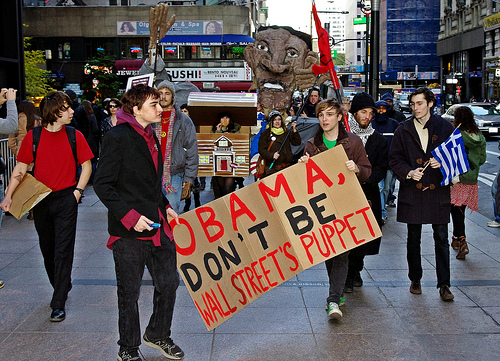Obama couldn’t have done it without Romney. But he couldn’t have done it without Occupy Wall Street, either. In fact he needed Occupy Wall Street first, in order to make full, effective use of Romney. Here’s what I mean.
Political hacks — pardon, that should be political strategists — don’t care much about the actual forces that shape and warp people’s lives. What gets their attention is forces that somehow break through into mass awareness, where they can be exploited for votes. Take a Canadian example: nationalism. It’s always there in some form — international hockey, literature, beer ads. But sometimes it heightens and they’re on it. The Liberals in the 1988 election grabbed nationalism and almost defeated free trade. Preston Manning’s Reform party in the 1990s said they’d “heard” about this thing and tried to wield it but couldn’t find the handle. Harper’s Tories have been more effective, striking national pride chords like the War of 1812 to build support for their militarism.
Social inequality — the income gap — has been there for decades too. Observers have noted it, especially recent increases, which are stunning. The rich get more, everyone else has less, the middle diminishes. The 2008 crash was a critical marker: a result of nothing but greed by unproductive bankers. They got bailed out just as Obama was coming to power. It’s grown clear since then that he has no real beef with super-wealth, in fact he seems pretty corporate himself. His main economic appointments were Wall Street types: Larry Summers and Tim Geithner. He put no serious conditions on the bailouts, like limits on CEO compensation. He even has a kind of corporate personality: he’s very competitive. He doesn’t just love playing basketball, he has a deep need to win.
The aftermath to the bailouts was the real revelation: the bailed-out were graceless and unrepentant. They resisted any similar help for the majority. Obama played along. His stimulus program was mild, like his aid to stressed homeowners. Books such as The Spirit Level (2010) pointed to the swelling damage but it was just a book. Then came Occupy Wall Street in the fall of 2011, with its slogan about the 1 per cent versus the 99 per cent. It resonated because it jibed with what people saw and experienced. It entered mass awareness. Occupy didn’t discover the gap, but they put it out where it could get political traction.
Obama’s “strategists” noticed. They were worried with an election coming and no serious recovery for anyone but the rich. Rising inequality began appearing in his speeches. Even Republicans noticed. They went from calling Occupy a mob, to saying they too fretted over “income disparity.” Obama’s own renditions of the theme were, I’d say, unenthusiastic, culminating in his listless performance at the first debate. Then, ironically, his competitiveness kicked in, he picked up his game, and went on to Tuesday’s victory.
But none of it would have worked, had Republicans not nominated the embodiment of Mr. One Per Cent, Mitt Romney. He likes firing people. He thinks 47 per cent of Americans are irresponsible takers. He parks his money abroad and won’t release his tax returns. All he lacks is a top hat and he surely has one in one of his homes. But the attacks, in turn, wouldn’t have taken, had Occupy not already poured the mould for Romney with its “1 per cent” trope.
In a deeper irony, most Occupiers deplore Obama. They occupied Wall Street to expose the true power behind Washington, including Obama. They “stormed” his campaign HQ in Chicago in May and occupied Charlotte during his September nominating convention there. Many refused to vote in the “sham” election or backed purer candidates. No matter, they still got Obama there. For critics who had charged they had no programs to offer, it turns out they had one: Obama’s re-election. It’s a classic case of what Hegel called the cunning of history.
For the record, I’d have voted for Obama too. U.S. voters slogged to the polls and made the best of two uninspiring alternatives. That takes guts. It may make Tuesday a less “grand” election, as NBC’s David Gregory said, than 2008. But it makes it more real. This was an election for grown-ups.
Photo: David Shankbone/Flickr
This article was first published in the Toronto Star.



